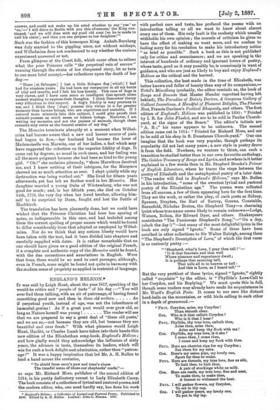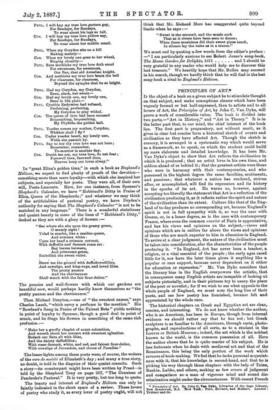ENGLAND'S HELICON.* Ex was said by Leigh Hunt, about the
year 1817, speaking of the would-be critics and " people of taste" of his day You will ever find them talking, with an air of patronage, of having found
something good now and then in these old writers As if perpetual youth, instead of age, was not the inheritance of immortal genius ! As if a great poet would ever grow old, as long as Nature herself was young i The reader will see that we are prepared to say a great deal of 'these old poets,' and we are so,—not because they are old, but because they are -beautiful and ever fresh." With what pleasure would Leigh Hunt, Hazlitt, or Charles Lamb have taken into their hands this new edition of the Elizabethan song-book, England's Helicon; and how gladly would they acknowledge the influence of sixty years, the advance in taste, themselves its leaders, which will win for such a book delight and admiration, rather than "patron- age !" It was a happy inspiration that led Mr. A. H. Bonen to lend a hand across the centuries, "To shield from envy's paw and time's abuse
The tunefal notes of these our shepherds' reeds,"—
as says Mr. Richard More, publisher of the second edition of 1614, in his pretty dedicatory sonnet to Lady Elizabeth Carey. The book consists of a eolleetion of lyrical and pastoral poems, and the modern editor, who, one need hardly say, has done his work •• Bagiaturs Helicon a Collection of Lyewal and Partorol Pones. Pahlished is 11100. Edited by A. H. Sullen. London John 0. Simms. 1E87.
with perfect care and taste, has prefaced the poems with an introduction telling ns all we want to know about almost every one of them. His only fault is the modesty which usually withholds his own opinion ; the morsels of criticism he gives us have the effect of making us want more, and we confess to feeling sorry for his resolution to make his introductory notice " as brief as possible." Such a book as this is not published only for critics and connoisseurs ; and we are speaking in the interest of hundreds of ordinary and ignorant lovers of poetry, whose taste, good as it may possibly be, is consciously in want of guidance, and who are just us likely to buy and enjoy England's Helicon as the critical and the learned.
This collection, the beet made in the time of Elizabeth, was better known and faller of beauty than any of its companions,— Tottel'a Miscellany (probably, the editor reminds us, the book of Songs and. Sonnets that Master Slender regretted having left behind), The Paradise of Dainty Devices, A Gorgeous Gallery of Gallant Inventions, A Handful of Pleasant Delights, The Phoenix Nest, Francis Davison's Poetical Rhapsody, and others. The first edition of England's Helicon was published in 1600: " Printed by I. R. for John _Kaska, and are to be sold in Paulee Church. yard, at the sign of the Beare." The editor's initials are "A. B. ;" his name appears to be unknown. The second edition came out in 1614: " Printed for Richard More, and are to be sold at his shop in S. Dunstanea Church-yard." One can imagine that the book was very popular, though perhaps its popularity did not last many years ; a new style in poetry drove it from the field. Nowhere, we venture to think, can such a transition be studied better than in our own favourite anthology, The Golden Treasury of Songs and Lyrics, and nowhere is it better explained in a few words than in Mr. Stopford Brooke's Printer of English Literature, where he traces the steps between the poetry of Elizabeth and the metaphysical poetry of a later date. "The reader will find in England's Helicon," says Mr. Millen in his introduction, " some of the sweetest lyrical and pastoral poetry of the Elizabethan age." The poems were collected from all sources, a few of them appearing here for the first time. They are the work, or rather the play, of such poets as Sidney, Spenser, Drayton, the Earl of Surrey, Greene, Constable, Barnefield, Nicholas Breton, the Shepherd Tony—a charming lyrist whose true name seems likely to remain unknown—Lodge, Watson, Bolton, Sir Edward Dyer, and others. Shakespeare contributes "The Passionate Shepherd's Song,"—" On a day, (slack the day !) "—but many of the most delightful lyrics in the book are only signed " Ignoto." Some of these have been ascribed in other collections to Sir Walter Raleigh, among them "The Shepherd's Description of Love," of which the first verse is so curiously pretty
Shepherd, what's Love, I pray thee tell P '— ' It is that fountain and that well Where pleasure and repentance dwell; It is perhaps that saunciog bell, That tolls all in to heaven or hell And this is Love, as I heard tell.'"
But the very prettiest of these lyrics, signed " Ignoto," rightly called " exquisite" by the editor, is " Phyllida's Love-Call to her Corydon, and his Replying." We must quote this in fall, though some readers may already have made its acquaintance in Mr. Ward's English Poets. It comes to our ears like distant herd-bells on the mountains, or wild birds calling to each other in a depth of greenwood:—
" Parc. Corydon, arise, my Corydon!
Titan shineth clear.
Cott. Who is it that oalleth Corydon P Who is it that I hear P Part. Phyllida, thy true love, oalleth thee, Arise then, arise then, Arise and keep thy flock with me !
Cos. Phyllida, my true love, is it she ?
I come then, I come then, I come and keep my flock with thee.
PHYL. Here are cherries ripe for my Corydon; Eat them for my sake.
Coil. Here's my oaten pipe, my lovely one, Sport for thee to make.
Puri. Here are threads, my true love, fine as silk, To knit thee, to knit thee, A pair of stockings white as milk.
Cos. Here are reeds, my true love, fine and neat, To make thee, to make thee, A bonnet to withstand the heat.
Pun,. I will gather flowers, my Corydon, To set in thy cap.
OWE. Twill gather pears, my lovely one, To pat in thy lap.
Firm. I will bay my true love garters gay, For Sundays, for Sundays, To wear about his legs so tall. Cos. I will buy my true love yellow say, For Sundays, for Sundays,
To wear about her middle .small.
Part. When my Corydon sits on a hill Making melody— COIL When my lovely one goes to her wheel, Singing cheerily- PLM. Sure methinks my true love doth excel For sweetness, for sweetness,
Our Pan, that old Arcadian knight. Con. And methinks my true love bears the bell For clearness, for clearness, Beyond the nymphs that be so bright.
PRIM. Had my Corydon, my Corydon,
Been, aim*, her swain— Cos. Had my lovely one, my lovely one, Been in Ida plain—
Part. Cynthia Endymion had refused, Preferring, preferring,
My Corydon to play withal. Con. The queen of love had been excused Bequeathing, bequeathing,
My Phyllida the golden ball.
Prim. Yonder comes my mother, Corydon, Whither shall I fly P
Con. Under yonder beech, my lovely one, While she passeth by.
Part. Say to her thy true love was not here; Remember, remember, To-morrow is another day.
Cos. Doubt me not, my true love, do not fear; Farewell then, farewell then, Heaven keep our loves alway."
In "great Eliza's golden time," in such a book as England's Helicon, we expect to find plenty of proofs of the devotion— something more than mere loyalty—with which she inspired her subjects, and especially her poets. They were all, of their own will, Poets-Laureate. Here, for one instance, from Spenser'e Shepherd's Calendar, we have " Hobbinors Ditty in Praise of Eliza, Queen of the Shepherds ;" and whatever we may think of the artificialities of pastoral poetry, we have Dryden's authority for saying that The Shepherd's Calendar "is not to be matched in any language." There is a wonderful stateliness and quaint beauty in some of the lines of " Hobbinors Ditty," decked as they are with a glory of flowers
"See where she sits upon the grassy green,
0 seemly eight!
Yolad in scarlet, like a maiden-queen,
And ermines white : Upon her head a crimson coronet, With daffodils and damask roses set : Bay leaves between, And primroses green, Embellish the sweet violet.
...... . . . Strew me the ground with daffodowndillies,
And cowslip!, and king-cups, and loved lilies.
The pretty pounce And the chevisauuce Shall watch with the fair fleur-delice."
The pansies and wall-flowers with which our gardens are beautiful now, would perhaps hardly know themselves as "the pretty panne° and the chevisaunce."
Then Michael Drayton, one of " the sweetest names," says Charles Lamb, " which carry a perfume in the mention." RIB " Rowland's Song in Praise of the Fairest Beta " yields nothing in point of loyalty to -Spenser, though a good deal in point of music, and he flings his flowers in something of the same rich profusion :-
" Make her a goodly chaplet of azure columbine,
And wreath about her coronet with sweetest eglantine. Bedeck our Beta all with lilies, And the dainty deffodillies ;
With roses damask, white, and red, and fairest fletu,delioe, With cowslips of Jerusalem, and cloves of Paradise."
The lesser lights among these poets were, of course, the writers of the vers de societg of Elizabeth's day ; and many a true story, no doubt, is told in the disguise of their quaint conceits. Such a story—its counterpart might have been written by Praed—is told by the Shepherd Tony on page 207, "The Countess of Pembroke's Pastoral." It is very pretty, but too long to quote.
The beauty and interest of England's Helicon can only be faintly indicated in the short space of a review. Those lovers of poetry who study it, as every lover of poetry ought, will not think that Mr. Richard More has exaggerated quite beyond limits when he says :—
"Sweet is the concord, and the untie sorb That at it rivers have been seen to dance; When these musicians did their sweet pipes toaoh, In silence lay the vales as in a trance."
We must end by quoting -a few words from the editor's preface : —"I am particularly anxious to see Robert Jones's song-book, The Muses Garden for Delights, 1611 . . . . . . and I-should be • very grateful to any reader who would help me to discover this lost treasure." We heartily hope that Mr. Ballen may succeed in his search, though we hardly think that he will find in the lost song-book-a. rival.° .Bngland s Helicon.



































 Previous page
Previous page